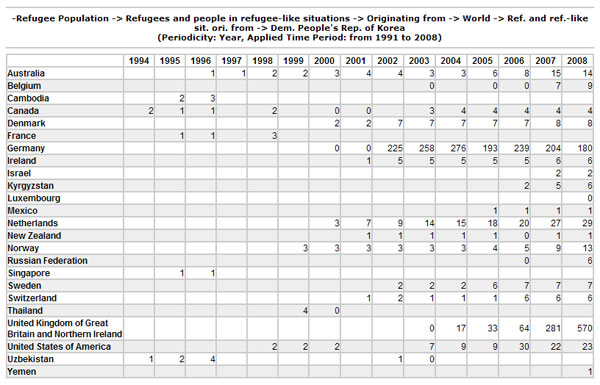UPDATE: According to Yonhap, Chinese and Australian ships were shipping the arms:
North Korean cargo carrying arms exports to Iran left a western port five days after Pyongyang’s nuclear test in May and was transferred aboard Chinese and Australian freighters before being seized by the United Arab Emirates (UAE) in July, according to an Italian company that handled the delivery.
Mario Carniglia, head of the international freight-forwarding firm Otim, said the containers, reportedly loaded with rocket launchers, detonators, and munitions, were shipped via the Chinese cities of Dalian and Shanghai and were transferred to an Australian vessel just after the U.N. Security Council adopted Resolution 1874 which bans the North from engaging in arms trade.
“(The containers) left the Nampo Port on May 30,” he said in a recent interview with Yonhap News Agency in Rome on Wednesday. A North Korean ship carrying the 10 containers arrived in Dalian two days later and a Chinese cargo ship moved them to Shanghai on June 13, he said.
“The containers were placed on (the Australian freighter) ANL-Australia in Shanghai,” he said, flipping through related documents.
The cargo was on its scheduled course until the UAE intercepted the ANL-Australia on July 22. The U.S. Navy had been focusing on trailing another North Korean vessel, the Kangnam 1, which appeared to be headed to Myanmar also carrying weapons exports.
The seizure was the first made under Resolution 1874 that calls upon all states to inspect cargo to and from North Korea if they have “information that provides reasonable grounds to believe the cargo contains” illicit weapons.
The Australian government said earlier, based on its own probe, that there were rocket-propelled grenades and other weapons in the seized containers, though Carniglia said his firm did not know the contents of the cargo.
He said North Korea provided documents identifying the content as “Oil Pumping Equipment.”
“We couldn’t see the contents as the containers were sealed when shipped from Nampo,” he said in the interview conducted in Italian. He refused to identify the exporter in North Korea, citing business ethics.
“All we were responsible for was handling the shipping from China to Iran,” Carniglia said.
He added that North Korea has not filed a complaint or asked for the return of the cargo, held at the UAE now for more than 50 days.
The UAE is reportedly in consultation with the U.N. sanctions committee on how to handle the seized shipment.
In a related move, the U.N. committee demanded an explanation from North Korea last month for the apparent arms export attempt.
The head of the North’s mission to the U.N., Sin Son-ho, sent a reply letter reiterating his country’s position that it is not bound by any U.N. resolution.
Sin also said that North Korea’s experimental uranium enrichment program is in a “completion phase,” claiming the country has made advancements in mastering an alternative route to producing nuclear weapons apart from its plutonium-based program.
ORIGINAL POST: According to Bloomberg:
The United Arab Emirates has seized a ship carrying North Korean-manufactured munitions, detonators, explosives and rocket-propelled grenades bound for Iran in violation of United Nations sanctions, diplomats said.
The UAE two weeks ago notified the UN Security Council of the seizure, according to the diplomats, who spoke on condition they aren’t named because the communication hasn’t been made public. They said the ship, owned by an Australian subsidiary of a French company and sailing under a Bahamian flag, was carrying 10 containers of arms disguised as oil equipment.
The council committee that monitors enforcement of UN sanctions against North Korea wrote letters to Iran and the government in Pyongyang asking for explanations of the violation, and one to the UAE expressing appreciation for the cooperation, the envoys said. No response has been received and the UAE has unloaded the cargo, they said.
…
he Security Council voted on June 12 to adopt a resolution that punishes North Korea for its recent nuclear-bomb test and missile launches through cargo inspections and enforcement of restrictions on financial transactions. The measure calls for the interdiction at seaports, airports or in international waters of any cargo suspected of containing arms or nuclear or missile-related materials going to or from North Korea.
According to the Wall Street Journal:
According to the Security Council diplomat, the weapons were carried on an Australian vessel, the ANL-Australia, which was flying under a Bahamian flag. According to an Aug. 14 letter sent to the U.N. sanctions committee, the exporting company was an Italian shipper, Otim, which exported the items from its Shanghai office.
“The cargo manifest said the shipment contained oil-boring machines, but then you opened it up and there were these items,” the diplomat said. ANL and Otim officials couldn’t immediately be reached to comment.
…
A spokeswoman for the Australian Department of Foreign Affairs and Trade said the Australian government is aware of the incident and is investigating to determine whether any Australian laws may have been broken.
The seizure could also raise fresh questions about North Korea’s intentions. After taking an aggressive stance against the West earlier this year, Pyongyang appears to have softened its rhetoric, releasing two captive American journalists and sending a delegation to meet with South Korea’s president.
Read more here:
UAE Seizes North Korean Weapons Shipment to Iran
Bloomberg
Bill Varner
8/28/2009
Cargo of North Korea Matériel Is Seized en Route to Iran
Wall Street Journal
Peter Spiegel and Chip Cummins
8/29/2009

